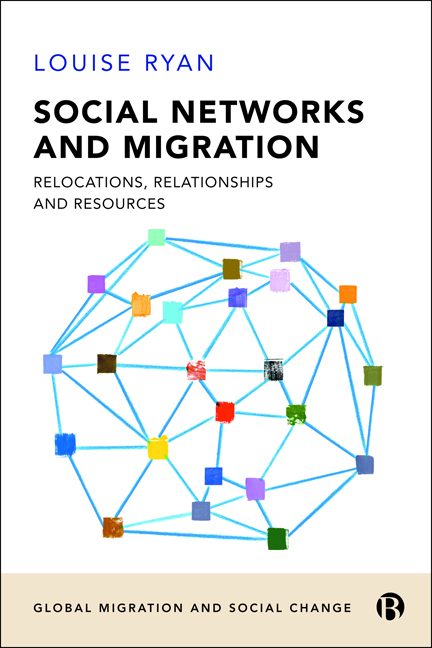Book contents
- Frontmatter
- Contents
- List of Figures
- About the Author
- Acknowledgements
- 1 Introduction: Embarking on a Book about Networks
- 2 Conceptualising Migrant Networks: Advancing the Field of Qualitative Social Network Analysis
- 3 Researching Migration and Networks: Empirical and Methodological Innovations
- 4 Social Networks and Stories of Arrival
- 5 Employment, Deskilling and Reskilling: Revisiting Strong and Weak Ties
- 6 Evolving Networks in Place over Time: A Life Course Lens
- 7 Transnational Ties: Narrating Relationality, Resources and Dynamics over Time
- 8 Conclusion: Thoughts and Future Directions
- Appendix
- Notes
- References
- Index
6 - Evolving Networks in Place over Time: A Life Course Lens
Published online by Cambridge University Press: 18 January 2024
- Frontmatter
- Contents
- List of Figures
- About the Author
- Acknowledgements
- 1 Introduction: Embarking on a Book about Networks
- 2 Conceptualising Migrant Networks: Advancing the Field of Qualitative Social Network Analysis
- 3 Researching Migration and Networks: Empirical and Methodological Innovations
- 4 Social Networks and Stories of Arrival
- 5 Employment, Deskilling and Reskilling: Revisiting Strong and Weak Ties
- 6 Evolving Networks in Place over Time: A Life Course Lens
- 7 Transnational Ties: Narrating Relationality, Resources and Dynamics over Time
- 8 Conclusion: Thoughts and Future Directions
- Appendix
- Notes
- References
- Index
Summary
Introduction
Friendship is ‘an important part of what makes us human’ (Bunnell et al, 2012: 490). While sociologists in the past may have been guilty of ignoring friendship as a ‘personal’ rather than ‘social’ relationship (Eve, 2002), in recent decades there has been a proliferation of work on the sociology of friendship (for example, Pahl and Spencer, 2004; Pahl and Pevalin, 2005; Reynolds, 2012; Vincent et al 2018; May, 2019). Among social network researchers, there has also been increasing interest in examining the number and nature of friendship ties (Wang and Wellman, 2010). For migration scholars, while there has long been attention on kinship ties, recent decades have seen increasing attention on migrants’ friendships (Kennedy, 2004; Conradson and Latham, 2005; Gill and Bialski, 2011; Ho, 2011; Bilecen, 2014; Ryan, 2015a; Robertson, 2018) and how migrants negotiate identities and attachments through relationality in new places (Butcher, 2010; Meier, 2014; Van Riemsdijk, 2014; Koelet, Van Mol and De Valk, 2017; Grzymala-Kazlowska, 2018) Of course, we must acknowledge ‘the ambiguities of concepts of “friend” and “friendship” as culturally and historically situated, and potentially overlapping with relations of family, kin, colleagues and acquaintances’ (Robertson, 2018: 543). As Ripley Smith (2013) observed in his analysis of refugee women's networks in the US, there may be cultural differences in how friendship is defined and understood. Therefore, it has been suggested that more research is needed in order to understand how mobility impacts on meaningful friendship relationships (Harris et al, 2020).
I have long been interested in how migrants make new friends in new places (Ryan, 2004; Ryan and Mulholland, 2014c; Ryan, 2015a). The first aim of this chapter is to take forward that work, drawing on the rich narratives of my diverse participants, by adding insights into the meaning of friendship ties and the varied ways in which new, local relationships are forged. As noted in Chapter 2, social network research is not simply about describing social ties but also analysing the antecedents and consequences of those relationships (Borgatti and Ofem, 2010). Hence, I consider how stories of friendship formations may indicate processes of embedding (Ryan and Mulholland, 2015; Mulholland and Ryan, 2022), suggesting the opportunities, as well as obstacles, for migrants to create attachments and belonging in particular places.
- Type
- Chapter
- Information
- Social Networks and MigrationRelocations, Relationships and Resources, pp. 104 - 127Publisher: Bristol University PressPrint publication year: 2023



